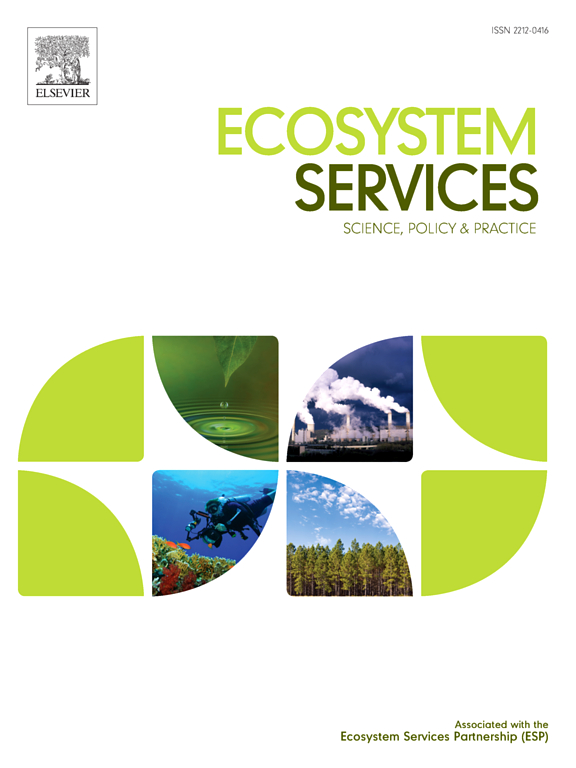Nature-related education and serious gaming to improve young citizens’ awareness about ecosystem services provided by urban trees
IF 6.6
2区 环境科学与生态学
Q1 ECOLOGY
引用次数: 0
Abstract
A widespread challenge of international urban policies is to achieve nature-rich cities. To achieve this aim, scholars and urban planners are developing innovative methods for considering the heterogeneity and geo-specificity of the composition of green infrastructures and their related services in the design of the urban green system.
Particularly in urban contexts with a high-density population, urban policies need the engagement of conscious communities to become effective; thence, public administrations need innovative, tailored educational methods to improve inhabitants’ awareness. To help the municipalities achieve this goal, we developed a serious game called ESS-Hunt. The paper evaluates the game’s educational effectiveness and the suitability of municipal tree cadastre data as its source of information.
The game was developed on the Google Maps platform and was played in an urban park of an Italian city (Perugia) involving 135 children aged 10–14. The participants answered the same questionnaire before and after the game to evaluate the learning process, and the paired t-test showed learning progress for all the statements with statistical significance (30 %, p. value < 0.05).
Regarding urban policies to improve citizens’ awareness about the role of the urban green systems in their well-being, our results highlight as overall principles (i) the suitability of municipal tree cadastre as a source of data to develop educational content, (ii) the effectiveness of serious games in the development of tailored, innovative learning solutions, (iii) and the need to develop differentiated and complementary educational methods to respond to the heterogeneity of local communities learning processes.

与自然相关的教育和严肃的游戏,以提高年轻公民对城市树木提供的生态系统服务的认识
国际城市政策面临的一个普遍挑战是实现自然资源丰富的城市。为了实现这一目标,学者和城市规划者正在开发创新的方法,在城市绿色系统设计中考虑绿色基础设施及其相关服务组成的异质性和地理特异性。特别是在人口密集的城市环境中,城市政策需要有意识的社区参与才能有效;因此,公共行政部门需要创新的、有针对性的教育方法来提高居民的认识。为了帮助市政当局实现这一目标,我们开发了一款名为ESS-Hunt的严肃游戏。本文评价了该游戏的教育效果和城市树地籍数据作为其信息源的适用性。该游戏是在谷歌地图平台上开发的,在意大利城市佩鲁贾的一个城市公园里进行,有135名10-14岁的儿童参加。参与者在游戏前后回答相同的问卷来评估学习过程,配对t检验显示所有陈述的学习进展具有统计学意义(30%,p值<;0.05)。关于提高市民对城市绿色系统在其福祉中的作用的认识的城市政策,我们的研究结果强调了总体原则:(i)市政树地籍作为开发教育内容的数据来源的适用性;(ii)严肃游戏在开发量身定制的创新学习解决方案中的有效性;(三)需要制定有区别和互补的教育方法,以适应当地社区学习过程的多样性。
本文章由计算机程序翻译,如有差异,请以英文原文为准。
求助全文
约1分钟内获得全文
求助全文
来源期刊

Ecosystem Services
ECOLOGYENVIRONMENTAL SCIENCES&-ENVIRONMENTAL SCIENCES
CiteScore
14.90
自引率
7.90%
发文量
109
期刊介绍:
Ecosystem Services is an international, interdisciplinary journal that is associated with the Ecosystem Services Partnership (ESP). The journal is dedicated to exploring the science, policy, and practice related to ecosystem services, which are the various ways in which ecosystems contribute to human well-being, both directly and indirectly.
Ecosystem Services contributes to the broader goal of ensuring that the benefits of ecosystems are recognized, valued, and sustainably managed for the well-being of current and future generations. The journal serves as a platform for scholars, practitioners, policymakers, and other stakeholders to share their findings and insights, fostering collaboration and innovation in the field of ecosystem services.
 求助内容:
求助内容: 应助结果提醒方式:
应助结果提醒方式:


